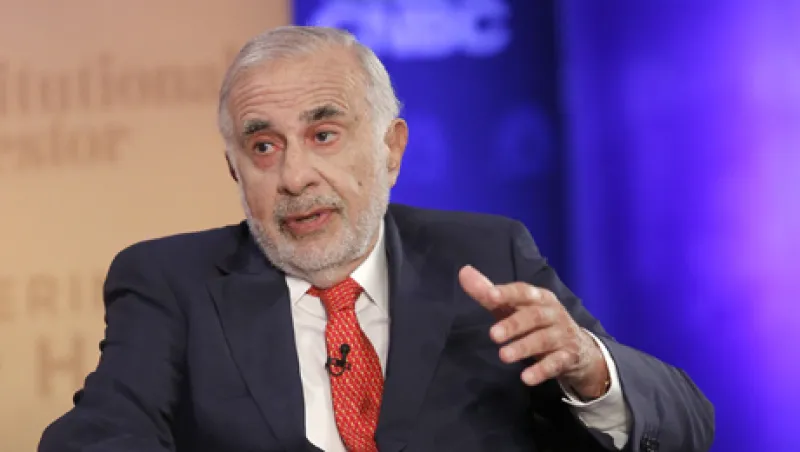Last week’s Delivering Alpha conference was filled with impressive speakers, lively investment chatter, insightful macro outlooks and even a fair amount of comedy. But ironically for a hedge fund conference, the event — hosted by Institutional Investor and CNBC — was short on one traditional staple: short-selling ideas. (Read more: Latest from Third Annual Delivering Alpha Conference)
Save for permabear Jim Chanos’s case for shorting construction-equipment manufacturer Caterpillar and Richard Perry’s condemnation of Japanese corporate bonds, the day was notable for a dearth of suggestions on what investors could profitably sell short.
In fact, Carl Icahn spiced up one of the day’s most-popular sessions by taking verbal swipes at Chanos and another prominent short-seller, William Ackman.
“I like Chanos. I think he’s a smart guy, but I think there’s a lot of things he hasn’t gotten,” the founder and head of Icahn Enterprises said in a candid interview. “I mean, you know, look at some of the stocks he shorted, they went way up.”
As for Ackman, Icahn has been engaged in an open feud with the Pershing Square Capital Management boss over Herbalife, a nutritional-supplements provider that Ackman branded a Ponzi scheme and shorted massively. Icahn bought the stock, and as he pointed out to the Delivering Alpha audience, he is currently on the winning side of the trade. “I like Ackman,” he said. “Anybody that makes me a quarter of a billion, I like.” (Note to short-sellers: If Carl Icahn says he likes you, check your pockets.)
In a conference filled with some of the top thinkers in the hedge fund industry, Chanos and Perry were the only managers to offer ideas on a strategy that has been central to hedge funds since the days of Alfred Winslow Jones. He set the template for hedge fund investing in 1949 when his A.W. Jones & Co. launched a fund that coupled long positions with short positions to alleviate risks associated with equity investing. Over fifty years later John Paulson made billions and became a household name by shorting subprime mortgage securities. (Read more: In Speaking Out, John Paulson Decides a Good Defense Is a Good Offense)
Big shorts like Paulson’s have been few and far between in the postcrisis years, however. In fact, the overall use of shorting has dwindled, says Will Duff Gordon, research director at information services company Markit, which tracks daily securities lending and borrowing data.
“The big convertible [arbitrage] funds who were shorting equities because they were long the convertible bond have kind of dried up a lot because they can’t get the leverage they require” to make the trades worthwhile, says Duff Gordon. “Another big block was the event-driven, or risk arbitrage, merger arbitrage hedge funds, and they’ve had a bit of a difficult time since the credit crunch because there’s been less M&A, less deals to get their teeth into. But there are signs of life in the merger arb market and we expect to see this strategy start to come back into favor.”
The Volcker rule has taken its toll on short positions as well. Shorting was a popular tactic employed by big banks’ proprietary trading desks, which the still-unfinished rule has largely disbanded.
That leaves the directional trade made by equity long/short funds. “How much short-selling does your typical long-short fund do?” says Duff Gordon. “The answer is not as much as you might think.”
For these managers, broader problems persist. Market movements are driven as much by the Federal Reserve Board’s quantitative easing policies, which have driven down interest rates and sent investors searching far and wide for higher yields, as they are by the fundamentals of a given company or security. The conference was rife with complaints that the Fed’s policies were distorting markets and making it harder to generate alpha.
“The market is totally losing any ability to get any insight into what the right rate is if you’ve got some gorilla in there buying the living daylights out of it and distorting the market,” said Michael Hintze of London-based hedge fund CQS.
To really see how shorting has tapered off, let’s go to the numbers. (Click chart to enlarge.)

The Markit chart above measures the evolution of the long-short ratio on U.S. stocks over the past five years. On July 24, 2008, there were 6.65 long positions for every short position. Today, that ratio has ballooned to 14.49-to-1. The stock market’s recent climb has raised the aggregate value of long positions to more than $4.78 trillion, while the value of short positions has remained stagnant at about $330 billion, substantially below precrisis levels.
There have been successful shorts in the past few years. Carson Block, chief of investment research firm Muddy Waters, profited handsomely after their report on commercial forest plantation company Sino-Forest sent the Chinese firm’s stock tumbling, a trade in which John Paulson took a long position.
Ackman’s much-publicized Herbalife short, which friend and rival-manager Daniel Loeb of Third Point went long on, like Icahn, is still playing out. Since December 20, when Ackman announced his position, the stock has gained 75 percent.
Icahn may have his own reasons for chiding Ackman and Chanos over particular short positions, such as Herbalife and Hewlett-Packard Co., but he also may have made an astute comment about the state of the art generally.
“Short-selling is difficult, competitive, you pay to borrow, you have infinite downside,” says Duff Gordon. “It’s not been easy.”






